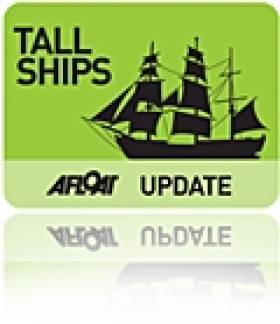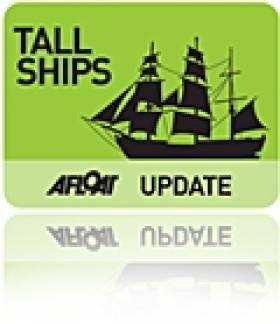Displaying items by tag: Allianz AllAboard
More Big Tallships Due for Start of Dublin’s Sailing Spectacle
#TALLS SHIPS – So far some 30 vessels of the 43 strong-fleet are berthed along the Liffey quays and the remainder of the fleet including some of the largest and most impressive A -class tallships are due tomorrow, writes Jehan Ashmore.
They include the Mexican Navy's sail training barque Cuauhtemoc (built 1982, length: 90m), the full-rigged ship, Amerigo Vespucci (built 1931, length 102m) also used for the same purpose operated by the Italian Navy.
Their arrival tomorrow, will certainly add to the exciting atmosphere as the first of the four-day free family festival begins. The festival is billed as the biggest festival event in Ireland, which is expected to draw an estimated 1 million visitors. An excellent opportunity to see these wonderful ships of sail is by taking the Allianz All-Aboard Liffey Cruise, with seats available for just €1!
One of the festival programme highlights will be the 'Crew Parade' (Friday August 25th), when 1,500 sailors are to walk through the city to a prize giving ceremony.
The weekend will culminate in spectacular fashion with the 'Parade of Sail' (Sunday August 26th) when all the ships leave port together with their graceful sails hoisted. For details of the action packed festival sponsored by the Polish port city of Szczecin and organised by Sail Training International visit: www.dublintallships.ie
It's nearly a week since the final Tall Ships Race leg was completed between Coruna and off Tuskar Rock Lighthouse, albeit in very stormy conditions with torn sails and even broken masts.
Having said that the weather has greatly improved with more sedate seas in which the tallships dispersed to ports Arklow, Dun Loaghaire, Howth, Wicklow and Waterford, last year's host port of the famous race and where in 2006 the crystal city first welcomed the fleet.
In recent days batches of tallships, of all shapes, sizes and classes have descended into Dublin Bay. Larger tallships tended to take a route via the Kish Bank, whereas medium and smaller classes clung along the Leinster coast and some made a transit through Dalkey Sound.
As of this afternoon, the Naval Service L.E. Emer (P21) provided escort duties as several vessels made passage parallel to the east coast and later docked in the cities 'docklands' quarter.
Among the arrivals were:
Danmark (class: A, rig: built: 1933, length: 74m) De Gallant (class B,rig: Gaff Schooner, built 1916, length: 36m) and Challenge Wales (Class C, Rig: Cutter, built: 2000, length: 22m)
The latest arrival came this evening with the Jubilee Sailing Trust's Lord Nelson, she is one of only two such sailing vessels in the world designed to accommodate both disabled and abled bodied sailors , for more details visit www.jst.org.uk
She had anchored off Wicklow before heading along the coast this afternoon, where she called into Scotsmen's Bay of Dun Laoghaire, albeit briefly and then headed for the short passage to the capital.
Join the Allianz All-Aboard Liffey Cruise For Just €1
#TALL SHIPS - Celebrating the arrival of the Tall Ships to Dublin, the Allianz All-Aboard Liffey Cruise for St Michael's House invites the public to join its maiden voyage of the River Liffey next weekend 23-26 August for just €1.
The unique tour of the city includes a cruise along the Liffey to the new developments at Docklands and the IFSC, and will get you up close and personal with the Tall Ships at Dublin Port - which begin arriving in the capital over the next few days for this year's festival.
Hosting what promises to be fun day out for all ages will be Allianz’s very own Captain Pete, who will be handing out treats to the younger - and not so young! - seafarers on board.
And what's more, your euro will go towards the great work done by St Michael's House for people with intellectual disabilities. St Michael's House is Allianz's chosen charity this year - find out more about its work.
The tour normally costs €12.60 but a limited number of places are available for booking for just €1 via the Allianz All-Aboard Facebook app HERE. Early booking is advised to avoid disappointment. See terms and conditions.































































